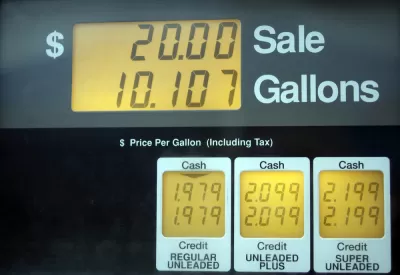New Jersey's 14.5-cent state gas tax, second lowest after Alaska's, may increase 23 cents thanks to a deal worked out between Assembly Democratic and Republican leaders and Gov. Chris Christie that reduces the sales tax. It now goes to the Senate.

Gov. Chris Christie insists that a gas tax increase must be part of a tax-cut package. It would appear that he is very close to getting that deal.
Just after midnight on Monday, the New Jersey state Assembly approved a plan to raise the gas tax, unchanged since 1988, by 23 cents per gallon in exchange for reducing the sales tax from 7 percent to 6 percent by 2018 and increasing the exemption for the retirement income tax, writes Susan K. Livio, statehouse reporter for NJ Advance Media for NJ.com.
The deal was hashed out between Christie, Assembly Speaker Vincent Prieto (D-Hudson) and Assembly Minority Leader Jon Bramnick (R-Union), who shuffled in and out of the governor's office from afternoon into the late night.
Reducing the sales tax, a regressive tax, marks a big change from abolishing or reducing the estate tax, a progressive tax, that was originally under consideration on Monday, in addition to other tax tradeoffs to salvage the state's Transportation Trust Fund, which will be broke next month. However, it also increases the toll to the state's general fund.
Gov. Christie released a carefully crafted statement indicating support, framing the agreement as a tax cut, not mentioning the 23-cents gas tax increase.
“I am pleased that the Assembly has heeded my suggestion for tax fairness, which I have been calling for for a long time. This is the first broad-based tax cut for all New Jerseyans since 1994. It is much-needed while at the same time we are going to have constitutionally-dedicated revenue to improve roads, bridges and the mass transit systems in the state.
"After the action the Assembly took, I look forward to working with the Senate between now and Thursday to hopefully bring this issue to a successful conclusion.”
The only member to voice opposition was the chair of the Assembly Transportation Committee, Assemblyman John Wisniewski (D-Middlesex), though A12 passed on a 53-23 vote.
"What we're doing tonight is wrong," he said. "It creates a hole in the budget at a time when we're already having trouble paying the bills that we all recognize we have not been able to pay."
While the reduction in the sales tax and change in retirement income taxes won't have much of an impact in the coming budget, they'll ultimately cost the state more than $1.7 billion a year.
Agreeing with Wisniewski was Star-Ledger editorial board writer Tom Moran, in a long rebuke of the Assembly's actions.
[T]his one goes into the record books. New Jersey has the nation's second lowest bond rating. But watch out, Illinois, we are going for the gold!
The Senate is very unlikely to buy this plan. So in the next few days, we'll probably have another round of wrangling past midnight, when nothing much good ever happens in the capitol.
However, the Senate already passed a plan to cut the estate tax in exchange for the increasing the sales tax. The only question appears to be how much of a hole Senators and Gov. Christie agree to dig into the general fund to keep the Transportation Trust Fund solvent.
Hat tip to AASHTO Daily Transportation Update and Carl Davis, Research Director at the Institute on Taxation and Economic Policy (ITEP).
FULL STORY: Gas tax hike, sales tax cut approved in surprise midnight Assembly deal

Study: Maui’s Plan to Convert Vacation Rentals to Long-Term Housing Could Cause Nearly $1 Billion Economic Loss
The plan would reduce visitor accommodation by 25,% resulting in 1,900 jobs lost.

Alabama: Trump Terminates Settlements for Black Communities Harmed By Raw Sewage
Trump deemed the landmark civil rights agreement “illegal DEI and environmental justice policy.”

Why Should We Subsidize Public Transportation?
Many public transit agencies face financial stress due to rising costs, declining fare revenue, and declining subsidies. Transit advocates must provide a strong business case for increasing public transit funding.

Paris Bike Boom Leads to Steep Drop in Air Pollution
The French city’s air quality has improved dramatically in the past 20 years, coinciding with a growth in cycling.

Why Housing Costs More to Build in California Than in Texas
Hard costs like labor and materials combined with ‘soft’ costs such as permitting make building in the San Francisco Bay Area almost three times as costly as in Texas cities.

San Diego County Sees a Rise in Urban Coyotes
San Diego County experiences a rise in urban coyotes, as sightings become prevalent throughout its urban neighbourhoods and surrounding areas.
Urban Design for Planners 1: Software Tools
This six-course series explores essential urban design concepts using open source software and equips planners with the tools they need to participate fully in the urban design process.
Planning for Universal Design
Learn the tools for implementing Universal Design in planning regulations.
Smith Gee Studio
Alamo Area Metropolitan Planning Organization
City of Santa Clarita
Institute for Housing and Urban Development Studies (IHS)
City of Grandview
Harvard GSD Executive Education
Toledo-Lucas County Plan Commissions
Salt Lake City
NYU Wagner Graduate School of Public Service


























